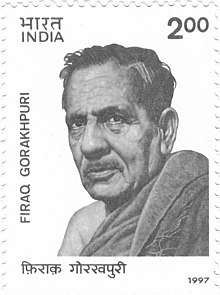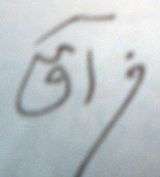Firaq Gorakhpuri
Raghupati Sahay (28 August 1896 – 3 March 1982), better known under his pen name Firaq Gorakhpuri, was a writer, critic, and, according to one commentator, one of the most noted contemporary Urdu poets from India.[1] He established himself among peers including Muhammad Iqbal, Yagana Changezi, Jigar Moradabadi and Josh Malihabadi.[2][3]
Firaq Gorakhpuri | |
|---|---|
 | |
| Born | Raghupati Sahay[1] 28 August 1896 Gorakhpur, North-Western Provinces, British India |
| Died | 3 March 1982 (aged 85)[1] New Delhi, India |
| Pen name | Firaq Gorakhpuri فراق گورکھپوری |
| Occupation | Poet, writer, critic, scholar, lecturer, orator[1] |
| Language | Urdu, English, Hindi |
| Nationality | Indian |
| Education | M.A. in English literature[1] |
| Alma mater | Allahabad University |
| Genre | Poetry, Literary criticism |
| Notable works | Gul-e-Naghma |
| Notable awards | Padma Bhushan (1968) Jnanpith Award (1969) Sahitya Akademi Fellowship (1970) |
| Signature |  |
Early life and career
Raghupati Sahay was born in Gorakhpur on 28 August 1896 in a well-to-do and educated family. He finished his basic education and then completed his Master's degree in Urdu, Persian and English literature.[1]
Firaq had shown early signs of excellence in Urdu poetry and had always shown attraction towards literature. His contemporaries included famous Urdu poets like Allama Iqbal, Faiz Ahmed Faiz, Kaifi Azmi and Sahir Ludhianvi. Yet he was able to make his mark in Urdu poetry at an early age.[1]
He was selected for the Provincial Civil Service (P.C.S.) and the Indian Civil Service (British India) (I.C.S.), but he resigned to follow Mahatma Gandhi's Non-cooperation movement, for which he went to jail for 18 months. Later, he joined Allahabad University as a lecturer in English literature. It was there that he wrote most of his Urdu poetry, including his magnum opus Gul-e-Naghma which earned him the highest literary award of India, the Jnanpith Award, and also the 1960 Sahitya Akademi Award in Urdu. During his life, he was given the positions of Research Professor at the University Grants Commission and Producer Emeritus by All India Radio. After a long illness, he died on 3 March 1982, in New Delhi.[1]
Gorakhpuri was well-versed in all traditional metrical forms such as ghazal, nazm, rubaai and qat'aa. He wrote more than a dozen volumes of Urdu poetry, a half dozen of Urdu prose, several volumes on literary themes in Hindi, as well as four volumes of English prose on literary and cultural subjects.
His biography, Firaq Gorakhpuri: The Poet of Pain & Ecstasy, written by his nephew Ajai Mansingh was published by Roli Books in 2015.[4] The book included anecdotes from his life and translations of some of his work.
Selected works
- Gul-e-Naghma گلِ نغمہ [4]
- Gul-e-Ra'naa گلِ رعنا
- Mash'aal مشعال
- Rooh-e-Kaayenaat روحِ کائنات
- Roop رُوپ (Rubaayi رُباعی )
- Shabnamistaan شبنمِستان
- Sargam سرگم
- Bazm-e-Zindagi Rang-e-Shayri بزمِ زندگی رنگِ شاعری
Awards
- 1960 – Sahitya Akademi Award in Urdu
- 1968 – Padma Bhushan[5]
- 1968 – Soviet Land Nehru Award
- 1969 – Jnanpith Award (First Jnanpith Award for Urdu literature)[6][4]
- 1970 – Sahitya Akademi Fellowship
- 1981 – Ghalib Academy Award
Death and legacy
Firaq Gorakhpuri died on 3 March 1982 at age 85.[1] Firaq fought for secularism all his life and played a key role against the then government's effort to label Urdu as a language of the Muslims.[1]
References
- Remembering the greatest Urdu poet since Ghalib, Firaq Gorakhpuri. India Today. 3 March 2016
- Lucknow Christian Degree College to celebrate 150 years of glory. Times of India. 23 November 2012
- Peace was his obsession (IK Gujral used to quote Firaq Gorakhpuri). tehelka.com. 5 December 2012
- Books reflect a political fever. Times of India. 23 January 2015
- "Padma Awards" (PDF). Ministry of Home Affairs, Government of India. 2015. Archived from the original (PDF) on 15 November 2014. Retrieved 7 May 2018.
- "Jnanpith Laureates Official listings". Jnanpith Website. Archived from the original on 13 October 2007. Retrieved 7 May 2018.
External links
- (in Hindi) Firaq Gorakhpuri at Kavita Kosh